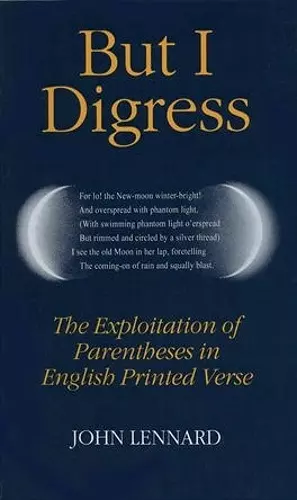But I Digress
The Exploitation of Parentheses in English Printed Verse
Format:Hardback
Publisher:Oxford University Press
Published:21st Nov '91
Currently unavailable, and unfortunately no date known when it will be back

Dr Johnson disapproved of parentheses and wouldn't use them; and for three centuries grammarians have argued that they are subordinate, additional, unnecessary, irrelevant, and damaging to the clarity of argument. But for Marlowe, Marvell, Swift, Coleridge, Byron, Browning, Eliot, Geoffrey Hill, and Derek Walcott (to name only poets) parentheses have been emphatic, original, necessary, relevant, and essential to the clarity of argument. They also intensify satire. Dr Lennard offers both a new history of the poetic use of lunulae (the marks of parenthesis) from their first appearance in England in 1494 to the present day, and detailed case-studies of individual poets who exploited lunulae. In combination the historical development of use and the individual's practice in a given period reveal the impact on literary composition of technological, philosophical, and political pressures, and the importance for the reader of regarding punctuation as a resource.
`subtle and wide-ranging investigation of the parenthesis in English poetry ... The excellences of Lennard's study are too many and, in many cases, too delicate to be easily stated. In its combination of the interpretive and historical study of punctuation, it may prove to be one of those rare books actually to invent, rather than merely to further, a field of study ... such a rich and rare one that the verve of his readings occasionally outstrips their self-evident cogency.' Durham University Journal
`The whole thing is a pedant's delight, but it deserves to be commended for its serious virtues: Lennard's scholarship is formidable and extensive, his talent for "close reading" of poetry is duly sensitive, and his argument against the neglect of punctuation in analysis of verse is convincing' Chris Baldick, Times Literary Supplement
`Fecund and jocund, well-earned and learned, wittily wily, But I digress is a delight and a treasure-house, alive with moving illumination and with benign warning, in short a delight-house of a book. It is the best work at once of literary criticism and of literary history I've read for many and many a day.' Christopher Ricks, London Review of Books
'His attempt ... to describe the whole history of the exploitation of round brackets in English printed verse certainly proves to be valiant, and convinces the reader that the history of punctuation generally is in great need of further research.' Times Higher Education Supplement
`subtle and wide-ranging investigation of the parenthesis in English poetry ... The excellence of Lennard's study are too many and, in many cases, too delicate to be easily stated. In its combination of the interpretive and historical study of punctuation, it may prove to be one of those rare books actually to invent, rather than merely to further, a field of study ... such a rich and rare one that the verve of his readings occasionally outstrips their self-evident cogency' Richard Terry, Durham University Journal
'There is much that ia admirable here. Lennard's sense of the graphic, the ironic, and his ability to trace quite different usages over time within a sustained narrative, his range, his sensitivity to detail and to what is important, all combine to build an argument that is more substantial than any individual part ... a book that breaks much new ground ... The volume is well printed and the bibliography extensive. It will clearly become an important and influential work.' Mark Bland, St John's College, Oxford, Notes and Queries, June 1993
Mr Lennard's illuminating interpretive analyses amply demonstrate the significance of the parenthesis. * The Scriblerian & the Kit-Cats, vol.29, Autumn 1996 *
ISBN: 9780198112471
Dimensions: 241mm x 161mm x 24mm
Weight: 714g
340 pages